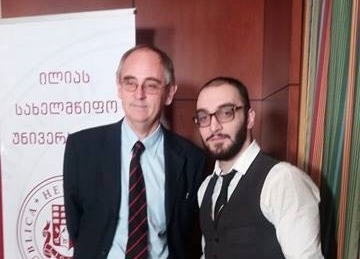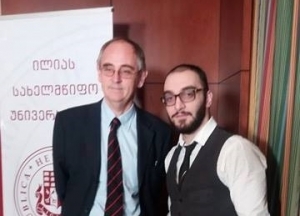Edward Lucas - Georgia Has Paid the Price for the West’s Education
Among the scholars studying and writing about the post-Soviet space and Georgia in particular, Edward Lucas ranks as one of the more profound, well-versed and knowledgeable.
The Economist’s international editor has been outspoken in his criticisms of the Russian government, with his book ‘Putin's Russia and the Threat to the West’ (2008) becoming a go-to source for many scholars, coining the term Whataboutism in the process. The book’s later edition shed more light on the 2008 war between Russia and Georgia, an occasion Edwards described as a warning the West didn’t heed. With Lucas arriving in Georgia for a public lecture organized by the Ilia State University, GEORGIA TODAY, which, among other things publishes The Economist’s licensed Georgian edition, was privileged to have an exclusive interview with the journalism ace.
When reviewing your book, The Newsweek stated that you’ve “built a very strong case for the prosecution of Vladimir Putin.” Do you ever see that happening in real life?
I think that if Mr. Putin faces prosecution it will be a very long trial, with a massive sentence at the end of it. The huge amount of money that has disappeared, so many dead people, among them the assassination of my friends, Boris Nemtsov and Anna Politkovskaya, and many others. I’m not sure if Mr. Putin is guilty of everything that he has been accused of, but certainly it would be a wonderful day if he ever was brought to face these charges.
So do you see him in The Hague Tribunal one day?
In a way, I’d prefer to see him on trial in Russia, really. I think international justice is good, but national justice is even better in this regard.
How do you see the developments in Europe now that Trump has become the US president? What does the future hold for NATO? Has the prospect of Europe creating its own Armed Forces become more real?
What I call a Tramp-Quake is going to have a bigger effect outside the US than inside it. US allies everywhere, and especially in Europe, are now thinking – what happens next? And in the case of Europe it’s partially their own fault. For years, they didn’t take defense seriously, they took it for granted and refused to spend real money on it, make real sacrifices or take real risks. So, in a way, it has been an accident waiting to happen and now that it happened, we have to deal with it. I think Europe is perfectly capable of defending itself – both in terms of money and human resources. As for NATO, I hope it survives. I hope Mr. Trump will soon realize that he needs allies and leaves the talk of the campaign as just that – talk.
In 2008, you argued that the only path to survival for Georgia was NATO membership. Eight years on, do you still see THIS AS A VIABLE, AND MORE IMPORTANTLY FEASIBLE, SOLUTION?
I think it’s fair to say that Georgia has paid the price for the West’s education, starting all the way back in the 90s. And I think it was a terrible mistake for the West not to push ahead with NATO expansion, for both Georgia and Ukraine, when we still could. Now the political will of NATO is much more diminished. And perhaps it’s less in Georgia as well – some people feel discouraged and I can understand why. But you have to continue to make Georgia a success – a political, economical, infrastructural success and the stronger Georgia is, the easier it is to imagine Georgian integration into both NATO and the European Union.
Vazha Tavberidze












